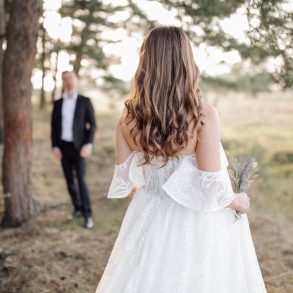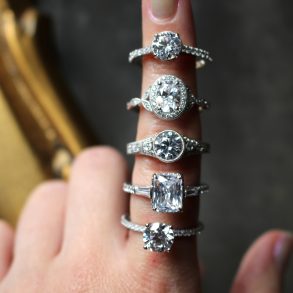Some wedding customs and superstitions are so deeply ingrained in our culture that we seldom question them. But have you ever wondered why a bride throws her bouquet over her head? What could possibly motivate a couple to keep a layer of cake frozen for a year? And why do brides go to such extraordinary measures to prevent their grooms from seeing their gowns before the ceremony?
Many wedding traditions kinda never made sense, but others have surprisingly clear reasons behind them. Does that mean we should stick to them? Let’s see! Below, we’ll look into the history of five wedding superstitions and show you how to mix tradition with a few fun, modern twists on your big day.
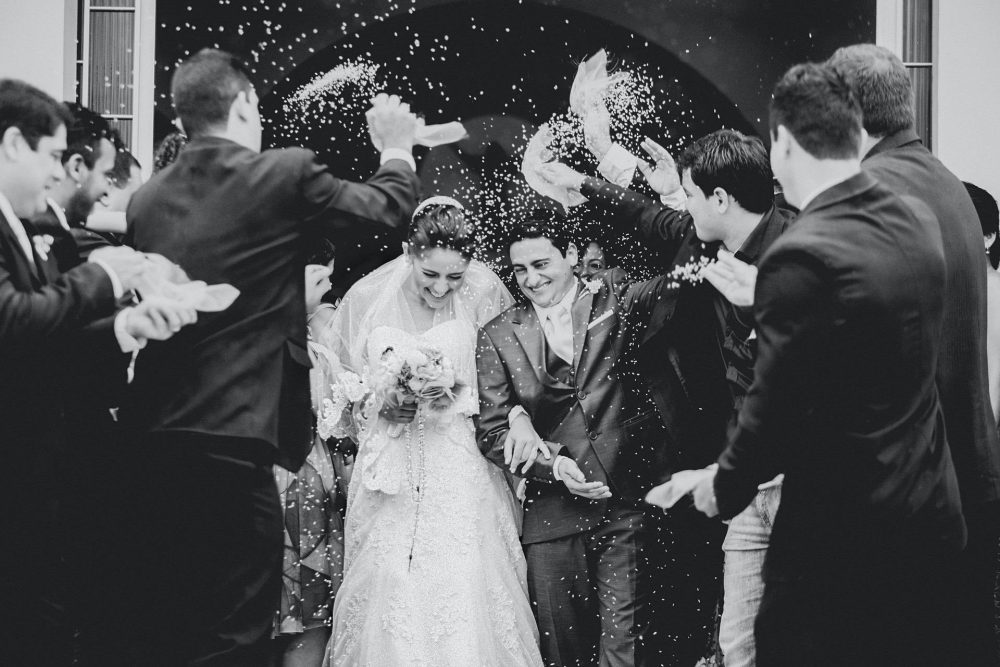
For Real—Why Shouldn’t the Groom See the Bride Before the Wedding?
Long before the era of social media and dating apps, couples used to meet on their wedding day. Cross our hearts, it’s true!
Can you imagine meeting the person you’re about to spend the rest of your life with at the altar? We don’t know about you, but it sounds like reality show material to me. Oh, wait! There is a reality show already…. Married At First Sight. But what if we told you there was a time when this scenario was the reality (minus the TV show, of course)?
The Origin of the Tradition
As strange as it may seem, arranged marriages used to be a common thing (and still are in some countries), when the wedding was nothing more than a business deal between two families—a simple exchange.
As with any business transaction, all terms had to be agreed to from both sides. Usually, the father promised his daughter to a wealthy, land-owning family in exchange for a herd of sheep, gold, or sometimes even a bottle of milk. What?
And if there’s one thing that has stood the test of time since people started getting married, it’s the father’s fear of giving his daughter’s hand in marriage. Although fathers now fear their daughters won’t be treated the way they deserve to be, back in the day, fathers feared the deal wouldn’t go through if their daughters weren’t considered “attractive.”
The logic behind this is flawless: if the groom met the bride before the wedding ceremony and thought she wasn’t visually appealing, he’d call off the wedding. Meaning: no herd, no gold, no milk. Just a daughter that no one would have, causing shame to the family.
So, why risk it?
Unwilling to take that risk, our ancestors came up with a plan that later on became a tradition. First, the bride and groom would not meet under any other circumstances aside from the wedding so that the groom wouldn’t have time to change his mind. Then, to ensure the deal was sealed, the bride would wear the veil until the very last minute, giving little to no time for the groom to back out.
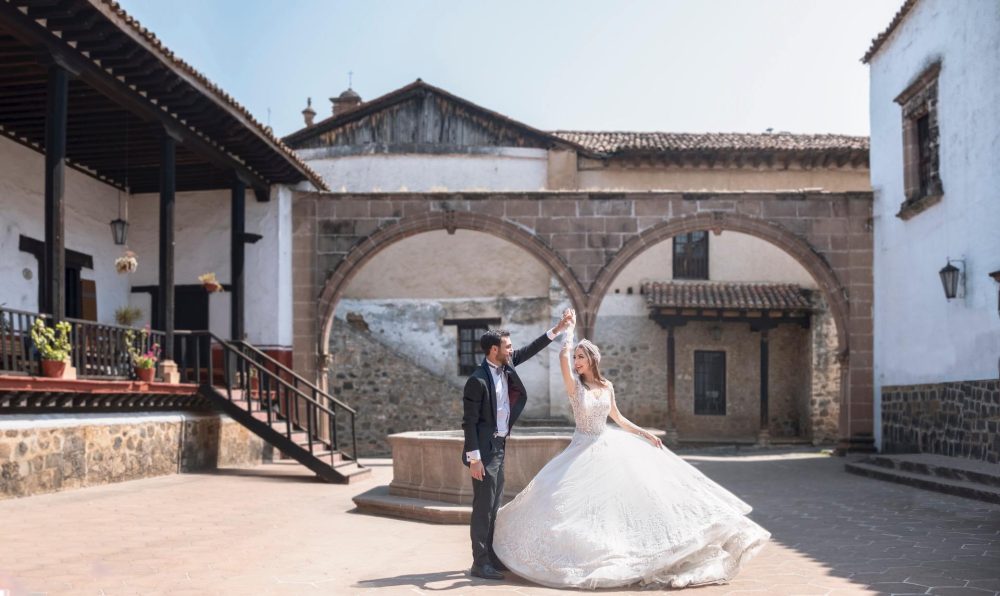
Did We Adapt to the Tradition or Change the Tradition?
In the era of social media and dating apps, we know more about our partners than we know about ourselves. We’re just one Google search away from finding out who they’ve dated, for how long, and where they work. We know all about their friends (and their families) even before we go out on the first date.
Many couples go the extra mile—literally—and go back to their family home in another town to avoid crossing paths with their significant other as the wedding approaches. Others go to the chapel together. But, in this day and age, it’s not a matter of tradition; it’s a matter of choice.
One question remains unanswered: will the world end if you break the tradition?
Nope!
But, you might still be wondering:
What Happens If the Groom Sees the Bride’s Dress?
The answer is in the question—he’ll see the dress. Even if you’re superstitious and think that it’ll bring bad luck, trust the science—there’s no proof that anything concerning will happen. Worst case scenario: he won’t like the dress. Although, for many brides, that is a genuine concern.
Should We See Each Other on the Wedding Day, Before the Ceremony?
There’s no rule set in stone when it comes to your wedding day. The only rules that exist are the ones you set. So whether you choose to spend the entire day apart, have breakfast together, or spend a week away from each other before you tie the knot, it makes no difference—at least not to anyone but you.
Wondering What Other Unique Wedding Traditions Exist around the World?
We wondered, too, so we did some digging! Here are some unique, crazy, unbelievable, and strange wedding traditions around the world. Not sure if the masses still practice them in modern times, but they’re still pretty interesting.
Ireland: Feet on the Ground Tradition
When the bride and groom dance in Ireland, the bride’s feet must remain on the floor at all times. This is because they believe that if they don’t, evil fairies will come and carry her away.
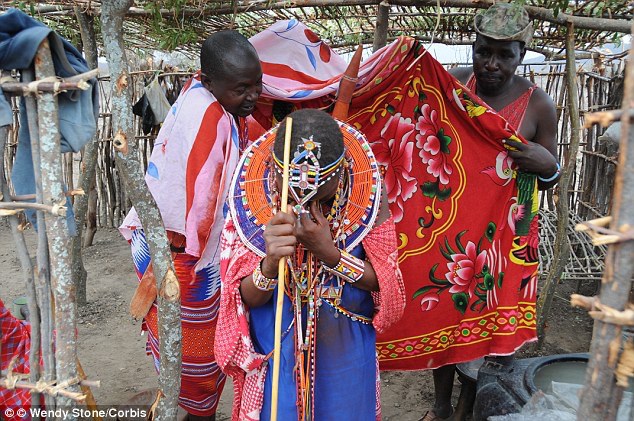
Kenya: Maasai Marriage Spitting
It is usual for the bride’s father to spit on his daughter’s head and breasts before she leaves with her husband during Maasai weddings in Kenya. Spitting is a sign of good fortune and luck in Maasai culture.
France: Le Pot de Chambre
Although we connect France with fine dining, a stomach-churning French wedding tradition called “La Soupe” is about as far from “Le Cordon Bleu” as you can go. Following the reception, guests would collect leftover food and drink in a chamber pot (uh, that’s a toilet) and deliver it to the newlyweds to consume ostensibly; it’s said to give them vitality for their wedding night.
Thankfully, nowadays, the couple is usually offered a slightly more delicious mixture of chocolate and champagne when the tradition is observed.
In Sickness and In Health… Not Even Tradition Can You Part
Traditions are tricky, but only as tricky as you let them be. The last thing you need when you’re planning your wedding is to stay on top of every tradition your mother, mother-in-law, or neighbors tell you about.
It’s your day, and you get to choose to adopt, adapt, or dismiss traditions as you please. So say yes to the dress, but feel free to say no to the tradition!




